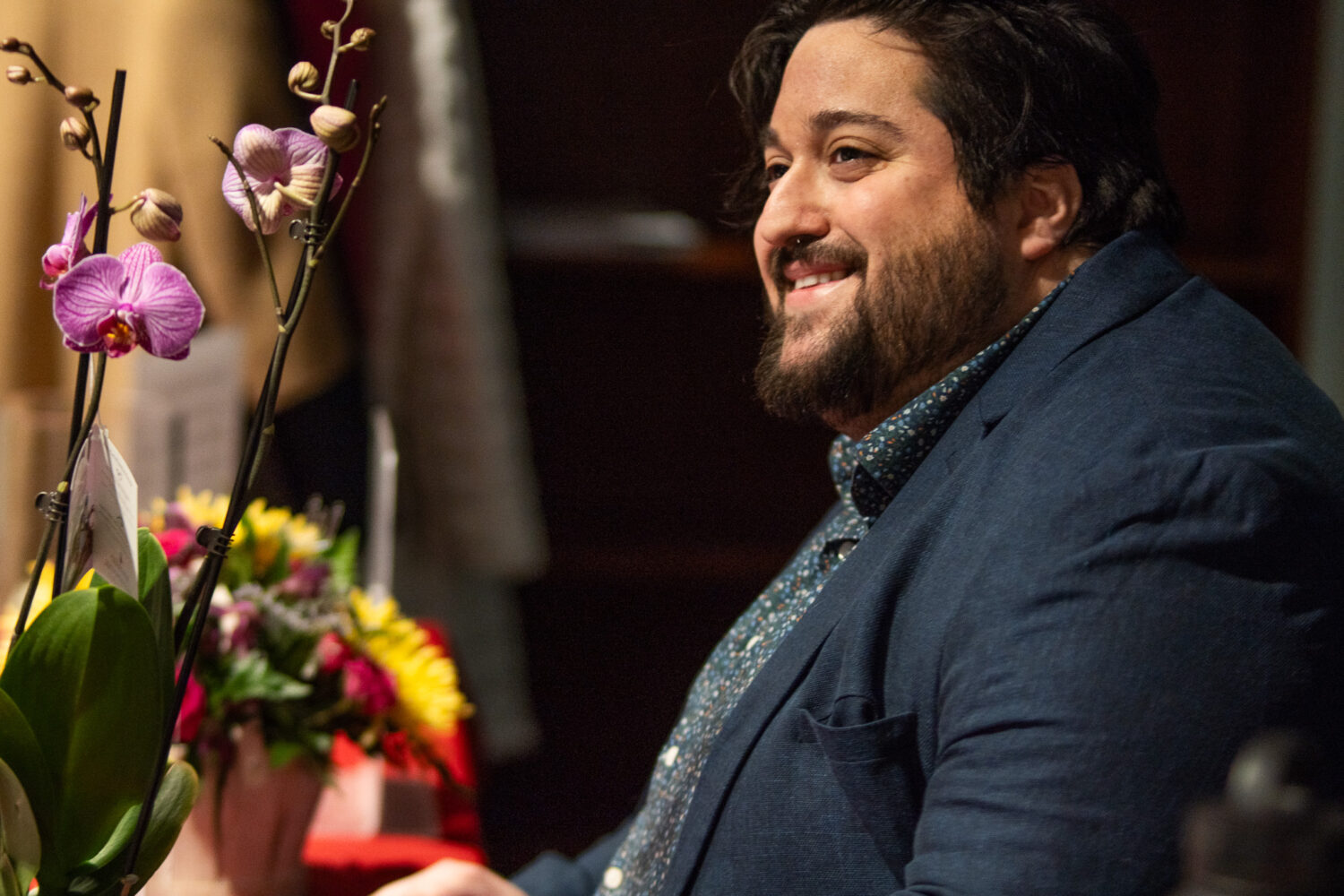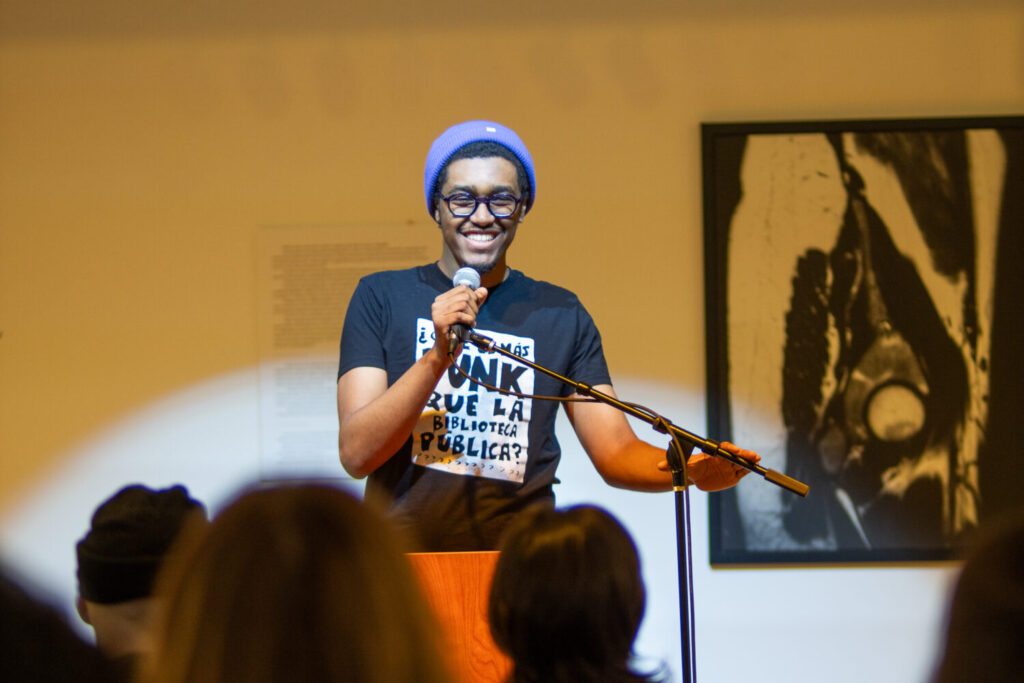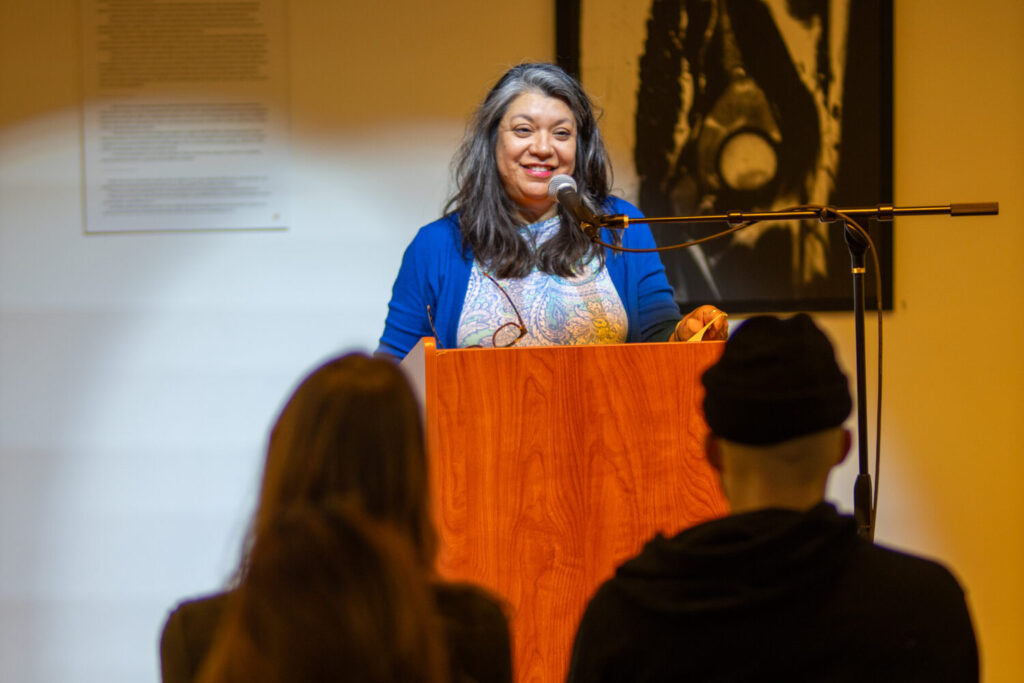
Art + Literature Laboratory (ALL) recently celebrated Steven Espada Dawson, Madison’s newest poet laureate, with a debut gala featuring a reading of his work, along with readings from Madison’s most recent poet laureate, Angela ‘Angie’ Trudell Vasquez, and Chessy Normile, a former UW Creative Writing Institute Fellow. The evening was hosted on World Poetry Day, March 21, by poet Jonny Teklit.
Dawson was a UW-Madison Creative Writing Institute Fellow from 2022-2023, and decided to stay in town at the program’s conclusion. He currently works as the office administrator at ALL.
“I’m indebted to Angie and Chessy for agreeing to read tonight. They are two of my favorite poets and people, and for me, they represent why I came to Madison and why I’m staying here,” Dawson said in his opening remarks to a crowd of friends and colleagues, some of whom traveled from out of town to celebrate him.
Dawson went on to describe Vasquez as that “‘wise tia’ who’s been around the block more than you” and thanked her for taking the time to meet with him before accepting his laureateship. During her time as poet laureate, Vasquez established the first youth poet laureate program in the city. Each youth poet laureate will serve a one-year term.
Vasquez kicked the night off with poems from her new manuscript, How to Write Absence, and her most recent book, My People Redux, delving into meditations about her family and what it means to be a second and third-generation Mexican American. Normile then tickled the crowd with a humorous set, including a log of thoughts she’s had in the shower, reading from her book Great Exodus, Great Wall, Great Party and a new chapbook from After Hours Press entitled Proceedings of the Ordinary Annual General Meeting.

Dawson closed with seven poems that grapple with grief, longing, and family, including “When My Brother Visits We Play Hide and Seek,” “Ars Poetica with Passing Hailstorm,” and “Elegy for the Four Chambers of My Mother’s Heart.” Relentlessly honest and vividly imagistic, these poems shine an intimate light on what it feels like to want to get the story right, by telling it again and again.
Hearing Dawson read, one might be surprised that his first act of poetry was done under what he called “nefarious circumstances,” dating back to his days in high school in Colorado. “I would sneak into the library specifically to steal lines of poetry for my love letters,” Dawson told Madison365 in an interview prior to the gala. “I totally passed them off as my own. The very sketchy foundation of poetry for me is just blatant plagiarism as a teen,” he joked.
But upon seeing a poster in that same library about a poetry contest, a young Dawson decided to write an original poem and submit it. Being the only one in the entire school to do so, he ended up winning the contest, and was awarded an iPod for his creativity.
Studying at the University of Colorado-Denver, Dawson said he was “incredibly lucky to stumble into the journal Copper Nickel.” Following the untimely death of its founder, Jake Adam York, in 2012, Dawson served as an editor for the magazine, and worked together with its managing editor to lift Copper Nickel out of its then-hiatus.
“I was sincerely just at the right place at the right time, not really taking poetry seriously yet but around people who were,” he said.
Dawson would then go on to get his MFA at Purdue University, where he worked with some of his “heroes,” including Kaveh Akbar and Roxane Gay, who both sat on his thesis committee. After graduating, he stumbled through various poetry side gigs to get by.
It wasn’t until Dawson applied to UW-Madison’s Creative Writing Institute Fellowship that he felt like he was really giving himself an honest shot at poetry. “[It was a] shot in the dark,” he explained. “I was positive I wasn’t going to receive it because the list of people who do it is really incredible.”
At the center of Dawson’s poetry are meditations on his older brother, who struggles with addiction. Dawson last saw him on the day of his high school graduation, and has been writing towards his absence ever since.
“For me, poetry helps me understand how I’m feeling,” he said. “Especially with my brother, having that lack of clarity about him is like a hole you truly try to fill with everything. I understand now that I can’t fill it, but I can understand its shape now a little bit better.”
He continued: “It’s great to be able to have cool publications, but for me, poetry really is the way that I can understand myself, understand members of my family even when they’re not around, and interrogate the past that is more accessible and less abstract for me.”
During his fellowship at UW, Dawson found himself writing more creative nonfiction than poetry, finding a new medium through which to process his familial relationships.
“I like to think of [my brother] as the thread that stitches these disparate things together. For me he’s played many roles in my life,” he explained. “Yes, he is this black hole and this mystery. But he also taught me a lot when I was growing up. He positioned himself as this important person in my life. Especially when you grow up without a father, as a kid, you’re looking for a father figure. If not father, what is the father figure?”

Because of current familial circumstances that require Dawson’s care and attention, he wasn’t actually sure if he’d accept his laureateship. Luckily, he had Vasquez to guide him.
“[Angie] was gracious enough, the day before I had to either accept or not accept, to meet me at a coffee shop, and we talked things out,” Dawson said. “It was really crucial in making this decision.”
More importantly, Dawson doesn’t feel too much pressure about following in Vasqeuz’s footsteps and the great work she’d done for the community as poet laureate. “The biggest piece of advice she gave me is, ‘This is your thing. It can be whatever you want it to be,’” he said. “She has huge shoes for me to fill but actually, I don’t need to. [I came] into that realization that my thing can be different than her thing.”
During his tenure, Dawson hopes to work with justice-impacted individuals throughout the whole state. Originally, his focus was solely on those who are or have been incarcerated, but “the shadow of incarceration is much wider than the individual.”
Dawson hopes to create an anthology of justice-impacted families and find someone to publish it so that they can have an “artifact” that they can take ownership of. Additionally, he hopes to be able to publish the work of those currently incarcerated.
“How do we bring something created in prison to the external world?” he asked. “So many incarcerated folks feel like what they do has no sort of change in the outside world. I’m thinking through how to get something made inside, outside.”
In many ways, these projects point to Dawson’s larger aims with his writing. Coming from a working-class immigrant background, it’s important to Dawson that his poetry is accessible to readers. “I don’t intend [my poetry] to be for the one percent, the elite,” he explained. “I want someone who I can recognize to recognize it.”
These goals of accessibility also influence Dawson’s work at ALL, where he organizes community workshops led by poets all around Madison. “[ALL is] making things accessible for practicing poets,” he said. “It’s such an intersectional place where different artists [with] different experience levels [meet]. It’s a great little hub.”
ALL’s first introduction to Steven was as a reader for its Watershed Reading Series, a free monthly poetry event featuring poets from across the city.
“It was one of those readings where afterwards a lot of people came up to me and asked me, ‘Wow, who is this poet? He’s so good.’ ALL Co-Director Rita Mae Reese recalled. “When he applied for the job, we thought that he was a great fit.”
Reese added that Dawson “almost immediately” became an integral part of the organization, helping to find people to host the community poetry workshops, grow the Watershed series, and solicit judges for ALL’s Wisconsin Writing Awards.
Dawson is also passionate about ALL’s library, which contains a collection of hundreds of chapbooks that are free for the public to borrow. “What I really like about Steven is how enthusiastic he is about our library and how he looks for ways to make sure the community can really take advantage of that resource,” Reese emphasized.
Even as he steps into the exciting role of “Madison’s poetry cheerleader,” Dawson won’t forget how it all began: “[ALL] really changed the game for me,” he said. “It really [made] me want to put down roots in Madison.””



